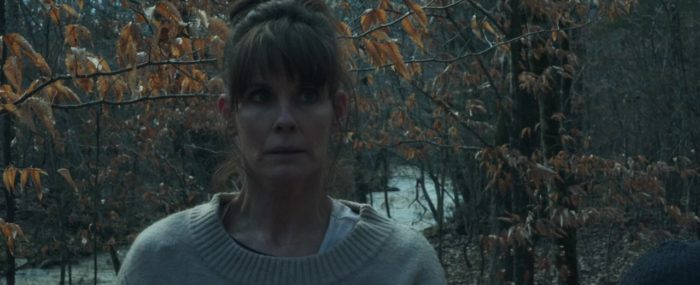A new indie horror entitled Tethered may call to mind Jordan Peele‘s Us with its “tethered” antagonists, but in the case of Daniel Robinette’s slow-burn wilderness horror, it’s a more literal title. The protagonist of Tethered, Solomon—played as a child by Brody Bett and as a young man by Jared Laufree—is literally tethered to his home. Blind and raised in seclusion by his protective mother (Alexandra Paul) and mysteriously absent father, Solomon is taught to be self-sufficient, foraging and hunting for food in the surrounding woods, finding his way back home via a long rope tied around his waist. This extended prologue portion of the film comes to an end when his mother departs one night without explanation. Solomon continues to live according to the rules his mother taught him, never lose the rope and always give back half of what you take from the forest, making an offering of half his captures, throwing them into the woods at the furthest reach of his tether, for receipt by some unknown scavenger.
He lives this isolated existence for many years until a gunshot heralds the arrival of Hank (Kareem Ferguson), a kindly hunter who stumbles upon Solomon in the woods and whose outside perspective begins to challenge his strange status quo. The film may quite definitely be a horror movie but its strongest asset is, in no uncertain terms, the very real sense of heart that develops between Hank and Solomon. Solomon is a young man who has lived almost half his life in total isolation, blind and with no one to see the world for him. We see in what fashion his mother loved him, sternly, from afar, and with a strict design on keeping him under tight control, even after her planned desertion. Kareem Ferguson’s delivery as Hank reminded me of Mr. Rogers. His innocent, altruistic curiosity and concern for Solomon, which evolves into a legitimate and reciprocal friendship, is touching, and easily the most compelling part of the film’s story. One sequence where Hank finds Solomon’s mother’s journal and reads it to him before bed, giving him for the first time in perhaps as much of a decade, something new from his mother, is lovely.
Tethered has a lot of The Village in its DNA with a young person kept in remote rural seclusion by their elders, kept in fear of the dangers lurking in the woods should they roam too far astray. However, its take on the material is a lot more indirect and obscure. Even by the very end, there are some questions that remain unanswered, leaving the viewer curious to revisit the earlier scenes, to search for foreshadowing that might shed some light on what’s going on: where did his father go? Why did his mother leave? What is the creature in the woods? The film’s opening voiceover does, in fact, have some very important implications as far as the plot goes, but much of that actual plot takes place offscreen. Solomon’s parents kept him ignorant of what was going on with them. His mother was apparently not right in her mind and his father then mysteriously vanished, but from what we see of her, Nidia is troubled but not unstable.

Tethered most definitely has aspirations of psychological depth and complexity, telling a folkloric tale of family dysfunction and estrangement, and some moments do testify to some real potential. However, the film has a notable deficit of actual good scares, with many of the more dread-filled scenes lacking much patience and coming with very little payoff. The film’s evident low budget placed constraints on the production that leave it pretty incapable of generating much in the way of real suspense of atmosphere. Although perhaps with such an obtuse ending, a truly suspenseful build-up would only exacerbate the sense of disappointment that creates.
Maybe with greater resources, the great potential in Tethered could have been fully realized, but as it is, it leaves one rather dissatisfied. The story has some real merit but the means to fulfill the ambitions aren’t quite displayed onscreen. There’s a lack of real narrative impetus and coherent mystery, the emotional connections between the characters aren’t explored quite deeply enough to really resonate and the film just isn’t able to craft scary moments out of thin air, which is what it often feels like it’s trying to do. With a blind protagonist, it should be easy to create original and suspenseful set pieces, but each scare scene here is just tepid and over-familiar with Matt Vucic’s score doing little to contribute any chills.
Screenwriter Aaron Sorgius—who also pulls double duty as cinematographer—clearly has a way with words with some of the film’s most absorbing moments arising out of the many pieces of writing left to Solomon by his parents, whether it’s in that journal or the bedtime story they recorded for him on cassette: “Baby Goat Goes Astray.” Despite the horror trappings, it’s in its most surprisingly wholesome moments that Tethered engages the viewer most effectively. Some horror movies have managed to marry these more tender elements to a narrative that still delivers visceral, pulse-raising chills, but despite its admirable ambitions, Tethered sadly doesn’t manage to thread that needle and access the few great ideas at its core.




I loved this movie. A little scary, but I don’t like a lot of scary. Well done I think.
Nice to see a movie that is not woke.
I just watched “Tethered” and I really liked it. It was a good story in itself without all the bells and whistles that some of the big budget movies have. I think with some mainstream movies the story gets lost with all the extra stuff Hollywood adds to keep some viewers engaged. I thought this was well done and enjoyed it very much!